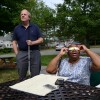I was near my phone a couple of weeks ago when I heard the beep indicating an important news alert. Supreme Court Justice Anthony Kennedy had resigned. I didn’t realize that I had said, “Oh no,” out loud until one of my colleagues responded to me.
I wasn’t exactly surprised. I had always figured that President Trump would get a chance to name more than one justice to the high court. Absorbing the news, however, I realized that I had not fully processed the reality of Justice Kennedy’s loss. What it would mean to have the high court without the possibility of a justice who sometimes saw enough merit in his ideological opponents’ viewpoint to cast his vote with them?
I’ve been morbidly fascinated by the ongoing ‘what now?’ dialogue — the public expressions of horror and delight — unmistakable evidence of the partisan divide. There’s not much middle ground — you either embraced the expletive-laced headline of the liberal leaning New York Daily News (inappropriate to recite here) or you were a fan of Leonard Lee, the executive director of the conservative Federalist Society. Lee has personally vetted most of the potential candidates for the Supreme Court. As one analyst pointed out, the president can make a squishy promise not to ask candidates their position on Roe v. Wade because he knows that Lee did ask. Justice Neil Gorsuch said he would follow precedent, but once he put on the black robes he, well, flip-flopped. That’s after he referred to Roe v. Wade as “the law of the land” during his Senate hearings, and declared more than once, “I follow precedent.”
Instead, he has ignored so-called settled law in cases — most notably in Janus v. AFSME — voting with the majority against state laws allowing public sector unions to collect non-member dues. Likewise, he reversed precedent in Abbott v. Perez upholding Texas’ racist redistricting, which clearly flouted the many legal precedents of the Voting Rights Act. As the old axiom says, “Don’t do as I say, do as I do.”
By the time you are hearing this, President Trump’s selection for the Supreme Court may be known. Machinations from the Democrats may slow the selection process, but politically there’s not much that party can do to block his selection. No, the power lies where is always has — with the voters.
I wish I could find the young African-American woman I talked to in the grocery store during the highly charged 2008 election campaign. I got all whipped up in response to her casual statement that she was likely not to vote because “what difference did it make?” Super voter me went into high gear, ticking off reasons her vote would make a difference, the Supreme Court chief among them. That seemed to give her pause, if for no other reason than she told me she’d never thought about it that way.
I’ll never know if she was moved to the voting booth as a result of our conversation. But I feel certain that in this historic moment, as the president helps significantly shift the court rightward, no voter can afford to take it for granted ever again.





